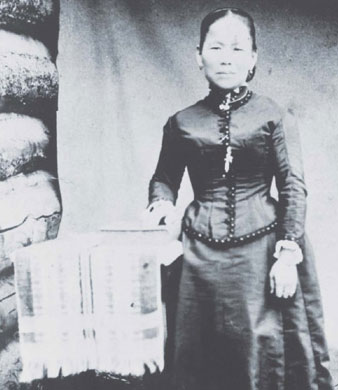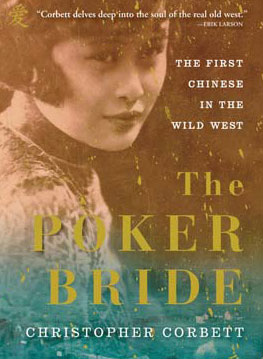Chinese who took a gamble
Updated: 2011-04-15 11:24
By Kelly Chung Dawson (China Daily European Weekly)
Experience in the early days of the US encompasses gold, greed and exclusion
The American Gold Rush of 1848-1852 continues to define the American dream to this day, drawing tens of thousands of people to the Wild West in an entrepreneurial sprint for glory and wealth. But little has been written about the large numbers of Chinese miners who were among the gold seekers. Thousands of Chinese traveled to the United States to make their fortunes, setting up early Chinatowns in mining settlements across the West before resentment and racism forced them out of the US with the enactment of the Chinese Exclusion Act of 1882.
 |
|
Christopher Corbett tells the story of Polly Bemis |
In Christopher Corbett's new book, The Poker Bride, he tells both their story and the story of one particular woman.
Polly Bemis, the concubine of a wealthy Chinese merchant, was by most accounts lost in a poker game to a man named Charlie Bemis, who took her to live with him on an isolated ranch in Idaho. Several years later, he married her, an entirely unheard of move at the time. When she emerged from the mountains nearly half a century later, she was greeted with great fanfare and fondness, as the legendary "Poker Bride".
Corbett tells the story of Polly's life in the context of the larger history of Chinese gold miners in the US, weaving details of her journey into painstakingly researched accounts of San Francisco's Chinatown, the lives of both Chinese miners and prostitutes in the US, and the social environment that may have set the stage for the Exclusion Act, which suspended Chinese immigration for more than 60 years.
In those days, Chinese who came to the US to work either on the railroads or in gold mines were called "sojourners" or more exotically, "Celestials". They tended to stick together, often made no attempt to learn English, and planned to stay in the land of "Gold Mountain", as the US was then known in China, only long enough to make a fortune to take home.
"Word of the discovery of gold in the California hills in the winter of 1848 had the same impact among the peasants of the densely populated Pearl River delta in southern China as it did in Boston's Back Bay or along the rocky coast of Maine," Corbett writes.
In 1852, more than 25,000 Chinese immigrants had arrived in California to mine gold. "The Chinese would have an almost immediate impact on California, for not only did they immigrate in significant numbers, but they would soon corner the labor market in jobs no one else wished to do. The Chinese would do any work and they would do it cheaply," Corbett writes.
This would later contribute to the resentment against the Chinese population, which coupled with their complete lack of desire to assimilate likely sealed their fate in some ways. White workers felt that the Chinese were taking their jobs, Corbett says.
"Most of that was nonsense," Corbett says. "Organized labor manipulated and exploited that whole scene. The Chinese never constituted a huge threat to anyone's job."
But the Chinese had defenders in the press, Corbett writes in the book. He includes an excerpt from Mark Twain's Roughing It, in which Twain wrote: '(The Chinese) are quiet, peaceable, tractable, free from drunkenness, and they are as industrious as the day is long. A disorderly Chinaman is rare, and a lazy one does not exist. He is a great convenience to everybody - even to the worst class of white men, for he bears the most for their sins, suffering fines for their petty thefts, imprisonment for their robberies, and death for their murders.
"Any white man can swear a Chinaman's life away in the courts, but no Chinaman can testify against a white man. Ours is the 'land of the free' - nobody denies that - nobody challenges it. Maybe it is because we won't let other people testify."
In most mining towns, the Chinese were often the victims of crime at the hands of white miners. "I do not think that any immigrant group suffered the abuses the Chinese did. Lynchings were not uncommon," Corbett says.
But regardless of their poor treatment, Chinese sojourners came of their own accord, with free will and rein to pursue gold and fortune. They were at first welcomed in the country, Corbett says. "They were considered good workers and were much in demand. Most Chinese immigrants were hard workers who wanted to make something of themselves. But there was a criminal element - let's not forget that."
 |
Indeed, in the book Corbett goes into great detail about the public impression of Chinese criminality, wanton behavior and the whorehouses of Chinatown and beyond.
He quotes Benjamin E. Lloyd, who in Lights and Shades in San Francisco documented Chinatown in detail: "Tremendous wealth and poverty existed side-by-side," Lloyd wrote about Chinatown. "But beneath the gold and marble veneer seethed another world populated by abused workers, exploited Chinese, alcoholics, gamblers, prostitutes, cutthroats, pettifoggers, and charlatans.
"The most disastrous effects of this traffic in human flesh and blood are seen in the Chinese quarter of San Francisco - in the Chinese houses of prostitution."
This was the world into which Polly Bemis was brought to the US, and while details of her later life are numerous and well documented, Corbett pieced together much of her journey through the accounts of historians who never actually met her. In fact, there were very few first-person accounts of what it was to be Chinese in the US, because so many Chinese who made the trip were uneducated and of the laboring class.
But Polly was different. As a result of her role in Idaho folklore, more details about her life have survived than most Chinese of the time.
"I thought Polly was a good subject," Corbett says. "She puts a very real human face on an experience that both fascinates and horrifies us. She is of interest to us because she is a real person who survived an experience that ought to have killed her."
While some accounts have disputed the truth of whether Polly was truly lost in a poker game, it is of historical record that she came to live with Bemis on his ranch on the banks of the Salmon River in Idaho.
In 1890 Bemis was shot and pronounced incurable by a doctor. Polly begged to differ, and nursed him to health. He married her shortly after. They lived together until the end of their lives. After his death she made two trips to town, both of which were front-page news.
"Her speech is excellent with just enough of the 'pidgin English' to make it fascinating," read one newspaper article about her visit to town in 1924. "Her memory is remarkable, particularly for dates, and her eyes twinkle as she tells jokes on herself, as she spoke of the miners not liking the coffee she made, and the way she silenced them by appearing with a butcher knife and the question, 'Why no like my coffee'?"
By this time, some resentment against the Chinese had faded. They had been largely absent since the Exclusion Act, and Polly was treated with kindness. In 1933, she passed away at her ranch. The Chinese Exclusion Act was repealed in 1943.
The Poker Bride paints a grim picture of the US faced by Chinese in the years leading up to the Exclusion Act, but in Corbett's thorough account of that world, he manages to document a humanity that white Americans often were blind to.
"The Chinese in the old days were remarkably resilient, patient and industrious," he writes. "Those are not clichs. The ghosts of the old Chinese - in a very real sense - haunt the American West, even today. We should never forget them."
E-paper

Han me downs
Traditional 3,000-year-old clothes are making a comeback.
Reaching out
Fast growth fuels rise in super rich
Chinese tourists spend more
Specials

Big spenders
More mainland tourists are expected to spend money on overseas travel this year.

Rise in super rich
Report cites rising property prices, gdp as key drivers of increasing number of chinese millionaires.

Reaching out
Condom makers are stepping up their presence in smaller cities to boost sales
